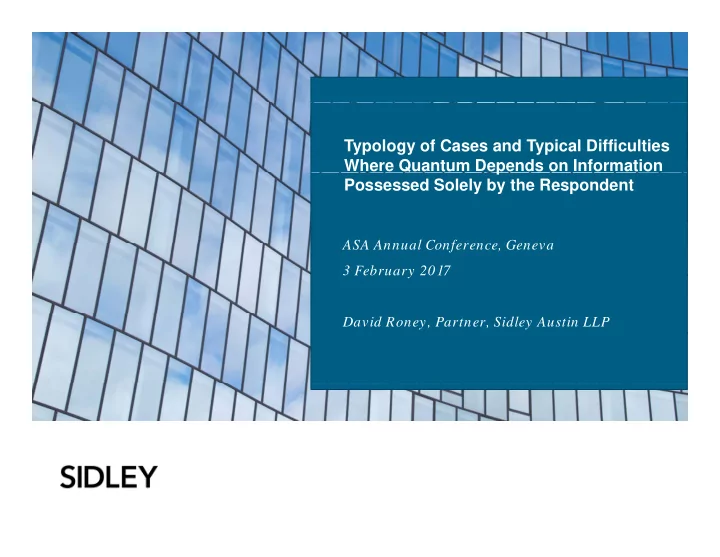

Typology of Cases and Typical Difficulties Where Quantum Depends on Information p Possessed Solely by the Respondent ASA Annual Conference Geneva ASA Annual Conference, Geneva 3 February 2017 David Roney, Partner, Sidley Austin LLP
1. Introduction In international arbitration, the Claimant ordinarily has the burden to prove quantum However, in certain cases, the information required to prove quantum is under the exclusive control of the Respondent What are typical cases where this scenario arises? What are typical cases where this scenario arises? What are typical difficulties that may need to be addressed? SIDLEY AUSTIN LLP 2
2. Typology of Cases Claims for Unpaid Royalties or Commissions Claim under IP license agreement where licensee fails to pay royalties due on sales of product royalties due on sales of product Claim under brokerage agreement where principal fails to pay commissions due on the value of referred business Claims for Disgorgement of Profits Claim for disgorgement of profits where distributor acts as “agent g g p g without authority” by making unauthorized sales outside of territory, e.g., Art. 423 Swiss CO Claim for disgorgement of profits based on “unjust enrichment” Claim for disgorgement of profits based on unjust enrichment where co-development partner misappropriates trade secrets, e.g., California Uniform Trade Secrets Act , Cal. Civil Code §3426.3 SIDLEY AUSTIN LLP 3
2. Typology of Cases (cont’d) Claims relating to Earn-Outs in the Post-M&A Context Claim for breach of implied covenant of good faith and fair dealing where buyer intentionally diverts clients to another division e g where buyer intentionally diverts clients to another division, e.g., American Capital Acquisition Partners LLC v. LPL Holdings Inc. , No. 8490-VCG, (Del. Ch. Feb. 3, 2014) Claims relating to calculation of the amount due under the earn-out, including disputes over accounting treatment and timing of revenue and expense recognition Claims for Breach of Partnership or Corporate Obligations Claim against managing partner for overcharging JV partnership for goods or services e g Art 536 Swiss CO goods or services, e.g., Art. 536 Swiss CO Claim against managing director of JV company for misappropriating corporate opportunities, e.g., UK Companies Act 2006 , s. 175 and common law fiduciary duties l fid i d ti SIDLEY AUSTIN LLP 4
3. Typical Difficulties What rights to information and documents are relevant? The Claimant could seek evidence based on substantive rights: − under the contract, e.g., employer’s right to audit contractor’s books and records under a cost-plus construction contract − under a statutory provision, e.g., non-managing partner’s d t t t i i i t ’ mandatory right to audit under Art. 541 Swiss CO Alternatively, the Claimant could seek evidence based on a procedural right to document production What difference does this make in terms of: − the procedure to be followed and tests to be applied? − the Arbitral Tribunal’s discretion in defining the scope of the rights and crafting appropriate relief? rights and crafting appropriate relief? SIDLEY AUSTIN LLP 5
3. Typical Difficulties (cont’d) Are there preliminary issues that must be determined in order to compute quantum? What “population” of transactions is relevant to compute the broker’s Wh t “ l ti ” f t ti i l t t t th b k ’ entitlement to unpaid commissions? Did the buyer breach the implied covenant of good faith and fair dealing and, if so, to what extent did this breach impact the amount due to the seller under the earn-out? What types and amounts of “equipment costs” are reimbursable What types and amounts of equipment costs are reimbursable under a cost-plus construction contract, e.g., rented equipment vs. owned equipment vs. small tools? SIDLEY AUSTIN LLP 6
3. Typical Difficulties (cont’d) How much access or disclosure is the Respondent required to provide? What kinds of information and how much of it is required to prove Wh t ki d f i f ti d h h f it i i d t the quantum of the claims? What can be done to address the Respondent’s concerns that a far-reaching audit will disrupt its on-going business? What can be done to address the Claimant’s concerns that the Respondent is not giving full access or is destroying evidence? Respondent is not giving full access or is destroying evidence? SIDLEY AUSTIN LLP 7
3. Typical Difficulties (cont’d) Are there any prohibitions or restrictions on the Respondent’s transmission of certain information and documents? W Would transmission to the Claimant be contrary to: ld t i i t th Cl i t b t t − contractual obligations, e.g., a contractual confidentiality clause covering prices and sales volumes to a third party? − competition law prohibitions on sharing of strategic pricing information, e.g., Arts. 4(1) and 5(1), Swiss Federal Act on Cartels and other Restraints of Competition ; European Cartels and other Restraints of Competition ; European Commission’s Information Exchange Guidelines ? − other statutory obligations, e.g., the prohibition on government contractor disclosures of information relating to defence under contractor disclosures of information relating to defence under the UK Official Secrets Act 1989 , s. 2 Are there practical measures or procedures that can be put in place t to address such concerns? dd h ? SIDLEY AUSTIN LLP 8
4. Contact Information David Roney Partner Sidley Austin LLP Sidley Austin LLP Geneva, Switzerland T: +41 22 308 0044 E: droney@sidley.com E: droney@sidley.com SIDLEY AUSTIN LLP 9
1,900 LAWYERS and 20 OFFICES located in commercial, financial and regulatory centers around the world Beijing Chicago Houston New York Singapore Boston Dallas London Palo Alto Sydney B Brussels l G Geneva Los Angeles L A l S San Francisco F i T k Tokyo Century City Hong Kong Munich Shanghai Washington, D.C.
Recommend
More recommend